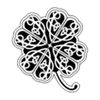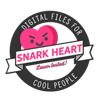Licensing Your Designs

When you sell digital designs, it’s important to clearly communicate what buyers are allowed to do with them.
Setting clear licensing terms protects your work, ensures fair use, and helps your customers feel confident about how they can use your creations.
Here’s a simple breakdown you can use when setting up your shop policies:
What Is A Personal Use License?
A personal use license means the buyer can use your design for their own private, non-commercial projects.
Under personal use, buyers can:
Make items for themselves.
Create gifts for family and friends.
Share photos of finished projects (credit is appreciated but not always required).
Buyers cannot:
Sell physical products made from your design.
Mass-produce or manufacture goods with your design.
Share, resell, or distribute your digital files to others.
When to Offer This:
Offer a personal use license if you want your designs used mainly for hobbies, crafting, or gifts — without competing with your own product lines.
What Is a Commercial Use License?
A commercial use license allows the buyer to create and sell physical products based on your design.
Under commercial use, buyers can:
Sell handmade goods like signs, ornaments, jewelry, and gifts.
Use your designs in client projects or at craft fairs.
Buyers cannot:
Resell, share, or redistribute the digital file itself.
Claim the original design as their own without permission (unless you allow customization credit-free).
When to Offer This:
Offer a commercial use license if you want to support small businesses, makers, or product sellers — while still protecting your original files.
Types of Commercial Licenses You Can Offer
You can tailor your licensing options based on how you want your work used. Common choices include:
Limited Commercial License: Allows a certain number of physical sales (e.g., up to 100 or 500 products).
Unlimited Commercial License: No limit on the number of products the buyer can sell.
No POD (Print on Demand) License: Restricts automated production (such as selling your design on Redbubble or Printify).
Editable Use License: States whether or not the buyer can modify your design for resale.
Tip:
Spell out any limits clearly — it prevents misunderstandings and protects your business.
Why Setting License Terms Matters
Protects Your Work: Prevents unauthorized sharing and reselling of your designs.
Builds Customer Trust: Clear licenses make buyers feel confident and supported.
Supports Your Brand: Offering flexible options can grow your audience while still controlling how your designs are used.
As A Seller, Be Sure To
Write your licensing terms in plain, clear language.
Include a simple license summary in your product descriptions.
Create a full license document or PDF that customers can download.
Be ready to answer customer questions about usage — it’s a great opportunity to build loyalty.
Final Pro Tip:
Give Your Buyers Options
Offer both personal and commercial options — customers love having a choice!
You can even price commercial licenses slightly higher to reflect the added value.




